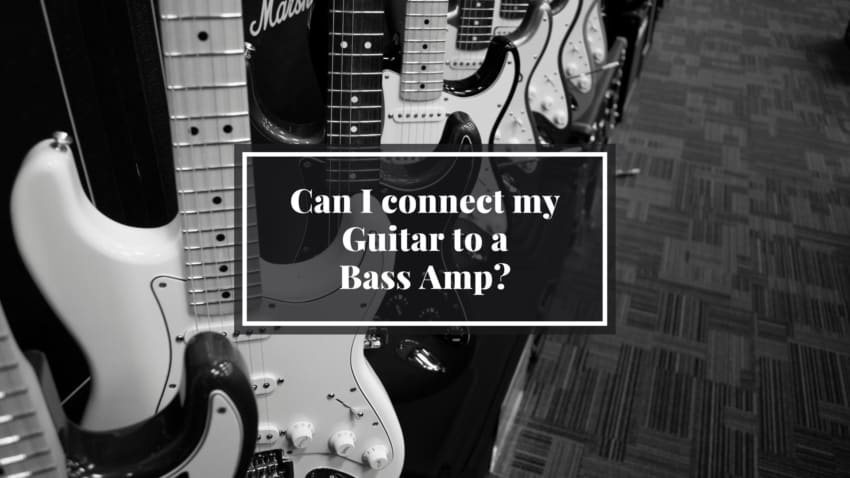Last updated on June 17th, 2020 at 11:29 am
Connecting an electric guitar to a bass amplifier is something that I’ve done multiple times when rehearsing with bands, and even though it always seemed to work just fine I often asked myself if it’s really something I should be doing.
I assume you have the same question and this is why you’re here!
So, without further ado, let’s answer that.
Will a bass amp work with an electric guitar?
Yes, absolutely.
Many well-known guitarists have used bass amps instead of guitar amps to record their music, and while they may sound different from guitar amps since they have larger speakers that are able to reproduce the lower frequencies in a better way, running a guitar through a bass amp won’t do any harm to the amp itself.
Let’s get into a bit more detail;
First and foremost, Guitar- and Bass amplifiers are more similar than they are different; both are used to amplify a weak signal.
Not only that, but they share the same EQ controls, they have similar circuitry, etc.
However, bass amps use larger speakers and are more powerful since they need to be able to bring the lower frequencies up to a high enough level without compromising headroom.
And this means that once you connect an electric guitar to it, now you have even more headroom before distorting the signal, which is great for achieving a clean guitar tone.
Of course, bass amps are designed- you guessed it- for bass, and this means that everything is tailored towards handling those lower frequencies, like the frequency response and EQ for example.
The EQ on a guitar amp is different than the one of a Bass amp, despite also being called “Bass, Mid and Treble”.
The bass knob on a guitar amp may be affecting the 200Hz region while the same knob on a bass amp may be affecting the 80Hz-100Hz region, and this is something that you need to take into consideration.
One thing I would recommend to anyone who wants to try this is to get an EQ pedal to be able to tailor the sound to their liking, especially for removing some of the low end since it will be quite prominent.
One other important note to take into consideration are the effects; bass amps usually don’t come with any built-in effects whatsoever, which means that in order to add something as simple as reverb, you will have to use a pedal.
Not only that, but guitar amps usually let you drive the signal in such a way that will create distortion, and they even have “Clean”, “Crunchy” and “Lead” channels, depending on the amps.
Again, with a bass amp you will need a Tube Screamer, or any other distortion pedal in order to achieve a similar sound.
Now, here’s one question that some of you might have, which is;
Will connecting an electric Guitar to a Bass Amp damage the Amp?
No.
A Bass amp, despite not being designed to deal with the high frequencies a guitar is capable of producing, will not be damaged if you play those high notes, and in some cases, they can even reproduce those notes just fine.
However, I’ve heard of some cases where people connected synths to a bass amp and after playing high-pitched sounds at high volume the amp ended up damaged, producing a hum from there on out.
Is there an Amp designed for both Guitar and Bass?
While you can use a bass amp both for playing bass and also guitar, there are some hybrid amps that have been designed to work well with both instruments.
These amps can accept both the inputs of a guitar or a bass and create a quality toe no matter which one is connected.
One example of this would be the Peavey Vypyr VIP 3, which works well with basses, electric guitars and even acoustic guitars.
Conclusion
You absolutely can connect a guitar to a Bass amp; in fact, this is how the Fender Bassman became popular, and like I mentioned previously, many well-known guitarists decided to record their hits using a bass amp instead of an actual guitar amp.
The one con I can think of is the lack of effects, since you will need to rely on floorboards a lot more; If you just plug the guitar directly into the amp you will get a pretty boring and dry sound, at least in my opinion.
But again, it absolutely can be done and you won’t damage your gear whatsoever!
